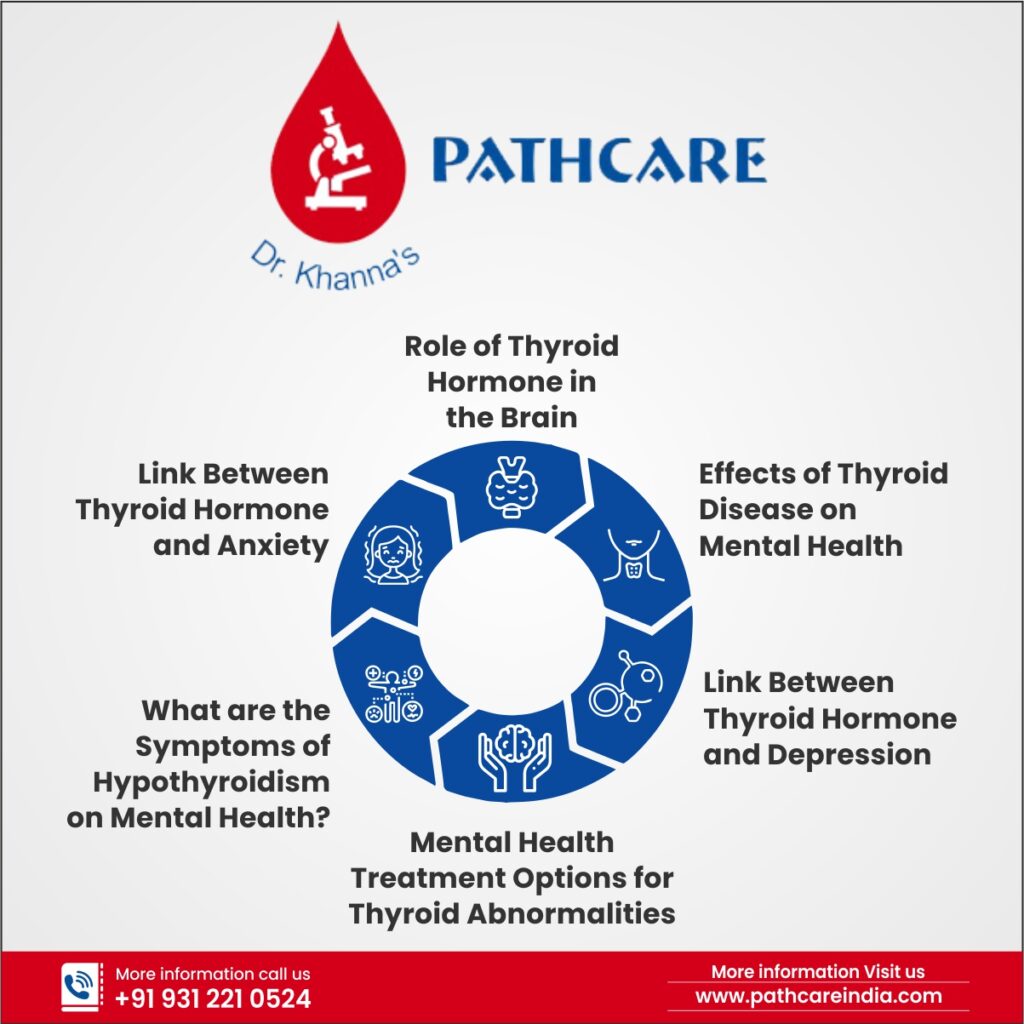No products in the cart.

The thyroid gland is a vital organ that plays many crucial functions, including regulating metabolism, growth and development, and other processes. It releases the thyroid hormone directly into the blood to perform its functions. Many studies have also linked it to significantly influencing mental health.
Moreover, thyroid dysfunction can lead to many serious mental illnesses, including anxiety and depression. You can take note of thyroid problems with early signs of mood changes and other symptoms. In this article, you will learn how deeply the thyroid connects to your mental health and why it is necessary to diagnose thyroid abnormalities.
Role of Thyroid Hormone in the Brain
The thyroid hormone plays a crucial role in the development and maintenance of our brain. They have an important role in brain growth and impact brain function throughout life. Normal brain development depends on thyroid hormones. They affect myelination, synaptogenesis, neurogenesis, and the differentiation and migration of neuronal and glial cells.
What’s more, the brain has one of the largest thyroid hormone receptors among all organs in the body. Neurons that make up our brain are quite sensitive to any abnormalities caused by the thyroid hormone compared to any other cells.
During fetal and postnatal development, thyroid hormone shortage may have a serious impact on the brain. This can affect the baby’s development due to delayed maturation, intellectual impairments, and neurological disability.
Effects of Thyroid Disease on Mental Health
Low and high thyroid hormone levels can affect mental health in various ways. There are two different scenarios of thyroid abnormalities in the body and their effects on the brain.
People with low thyroid hormones suffer from hypothyroidism. A sluggish metabolism results from the thyroid gland producing insufficient thyroid hormone when it is underactive. The most common causes of this disease are autoimmune thyroiditis and iodine deficiency. Adult hypothyroidism can result in drowsiness, hyporeflexia, and impaired motor coordination. It is also linked to bipolar affective disorders, depression, or a decline in cognitive abilities. Memory loss is frequently linked to subclinical hypothyroidism.
On the other hand, hyperthyroidism affects those who have an excess amount of thyroid hormone in their system. When the thyroid gland is hyperactive, it generates excessive hyroid hormone, which speeds up metabolism. It results in symptoms such as hyperreflexia, impatience, and anxiety.
Mood problems, dementia, mental disturbance, and personality changes can be brought on by hypo- or hyperthyroidism. The fact that most of these conditions are often treatable shows that adult-onset thyroid hormone changes impact neuronal function but do not result in long-term structural abnormalities.
Medications that reduce the body’s thyroid hormone production or restore lost thyroid hormone are frequently used as treatments for thyroid illness. The symptoms of thyroid illness, particularly those that impact mood, are frequently alleviated by treatment.
Link Between Thyroid Hormone and Depression
You can feel exhausted and lethargic and find it difficult to concentrate if you have hypothyroidism. You can also sleep excessively. You can become depressed as a result of all of these effects. Blood tests can verify these if they reveal low levels of the thyroid hormone thyroxine and high levels of the thyroid-stimulating hormone (TSH).
Thyroid replacement therapy may be more effective than antidepressants if you have both hypothyroidism and depression, according to studies. They increase thyroxin (T4) and triiodothyronine levels, also known as T3, two important thyroid hormones. You could feel better once thyroid medication reduces TSH levels.
Link Between Thyroid Hormone and Anxiety
While hypothyroidism is frequently linked to depression, it may also lead to anxiety. Any thyroid disorder may result in anxiety, but hyperthyroidism is more frequently to blame. The production and control of neurotransmitters, including serotonin, depend heavily on the thyroid hormone.
Anxiety, depression, and mood swings are all related to low serotonin levels. These neurotransmitters become unpredictable when your thyroid is not working correctly. This may result in anxiety and panic episodes.
What are the Symptoms of Hypothyroidism on Mental Health?
Fatigue, difficulty in sleeping, cognitive impairments, low mood, depression, and anxiety are all symptoms of hypothyroidism.
Studies have revealed that hypothyroidism has various negative effects on cognitive performance, including decreased focus, impaired psychomotor functioning, and memory problems.
What are the Symptoms of Hyperthyroidism on Mental Health?
Mental symptoms of hyperthyroidism include irritability, anxiety, emotional instability, insomnia, restlessness, sensitivity, and easiness of aggression. Mood changes, constant fatigue, sensitivity to heat, and weakening of the muscles are some of the additional symptoms.
Hyperactivity is a common symptom where you may have a lot of nervous energy and find it difficult to sit still. For those with hyperthyroidism, all action seems to be accelerated, leading to a condition resembling mania known as “manic veneer.” Mania or manic-depressive psychosis, sometimes known as bipolar disorder, might therefore be connected to hyperthyroidism.
Mental Health Treatment Options for Thyroid Abnormalities
Most of the time, psychiatric problems due to thyroid go better when the thyroid condition is treated and brought under control. It is usual for people to feel emotionally and intellectually unwell for some time, even after their blood tests return to normal. However, this improvement may take a bit of time to come about.
Even if the medical reason could be there, anxiety or sadness occasionally need to be treated on their own. Treatments without drugs, such as relaxation exercises or brief psychotherapy, can be beneficial. If your issue persists, your doctor may suggest a medication like an antidepressant.
Drugs known as anti-thyroid agents are used to prevent your thyroid from producing hormones. Iodine treatment is another method that medical practitioners employ to treat thyroid abnormalities. Your thyroid suffers damage after radioactive iodine therapy stops it from producing many thyroid hormones.
Winding Up
The thyroid plays a vital role in the overall well-being of our body. Catching the early signs of its dysfunction can help you prevent many serious mental health issues, including depression. Early diagnosis can help prevent the symptoms of abnormal thyroid from getting worse. The quantity of thyroid hormones in your blood is measured during thyroid blood tests to determine whether your thyroid gland is working correctly.





